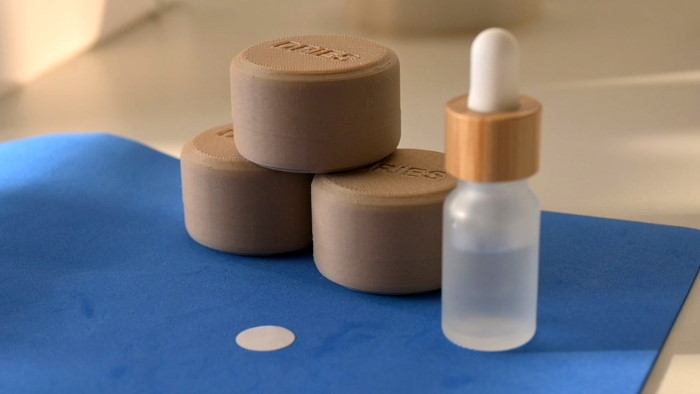)

UEA’s Professor Sheng Qi has developed a technology that removes 98% of water from beauty and skincare products, significantly reducing product weight, transportation costs and bulky packaging.
The process transforms water- and oil-based products into small discs of paper-like material which can be instantly rehydrated with a drop of water.
Here, Professor Qi talks us through the project’s exciting progress so far and its promising potential for the future.
How does DRIES technology work?
If you think about shampoo, shower gels, lotions, cleansers and so on, around 85% to 98% of the weight of those materials is water. So consumers are paying a very high price just for shipping those around the world. We take the water out by jetting the liquid out in a very thin liquid jet, which dries really quickly. The solid residues form very thin fibres which land on each other and form this material, which feels like a piece of paper.
What benefits could this technology bring to the industry? Presumably huge savings on transport, for starters?
At the moment, there's no company in the UK that has existing capability for this process in terms of large-scale production, so it's very hard for us to come up with a firm number for a comparison with current processes. But we know that shipping around products full of water generates a big carbon footprint due to the heavy weight and bulky packaging, often in plastic. This is why the beauty and personal care industries are very interested in the technology; because it will help them to reach their net zero goals much more quickly.
We plan to conduct a full life-cycle analysis of the production, from the raw material to the production, transportation and distribution, so we'll be able to understand the cost effectiveness as well as the carbon footprint of using this new process to manufacture beauty and personal care products.
How did the project initially come about?
We have been developing the technology since 2018. We started off making this type of material for pharmaceutical and drug delivery uses, but we realised that there could be applications in beauty, cosmetics and personal care, which have less challenging regulatory barriers for market entry. We began working in partnership with PBL Technology, a specialist technology and IP management company in 2020 and filed a patent in 2021.
Then we joined the ICURe Programme, which is an Innovate UK-funded programme for training early career researchers to explore what the potential market could be for their research. We talked to more than 120 companies and found out that the beauty and personal care industry really want it. This was validated by winning the highly competitive 2022 Cosmetics Cluster UK 32nd IFSCC Congress–Innovation in Action–Technology Showcase Challenge award, suggesting our technology is well-received by both experts and consumers.

What kinds of businesses are you talking to about adopting the technology?
We’ve spoken to quite a few different industrial sectors, from beauty and skincare to agritech, from multinational companies to UK home-grown brands. We’ve signed NDAs with multiple companies, allowing us to have more in-depth discussions about how our technology could be used to transform their current liquid-based product into a waterless product.
I think our project would be really good for growing local UK large-scale manufacturing capability for this electrospinning process. We do have a few companies within the UK that do electrospinning research and contract manufacturing, but there is no company specialised in personal care and cosmetics, and we don't have large-scale production capability here, whereas in China and Europe they do. So I think it'd be really good for UK to build our own.
With other companies creating waterless products, what makes yours different?
The key advantage of our technology is that we don't use heat for drying. Most of the industrial processes for creating a dry powdered product, like powdered soap, dry through processes like spray-drying, which uses quite a lot of energy and heat. And if you have expensive and delicate ingredients, like peptides and proteins, they are very sensitive to heat. So if you dry them at a high temperature, you will lose quite a significant percentage of their activity, which could be quite costly for producers. And that's why our technology is particularly attractive for companies.
And how are you finding combining your scientific work with a budding business?
Partnership with industry is crucial for translating our research and science developed in the lab to solutions for real-world needs. And I think that the whole point of scientists doing science is to solve real-world problems. I’m very much enjoying working with industrial partners – it's so much more interesting when you can see there’s an end product that could be used.
No results, try changing your search criteria
